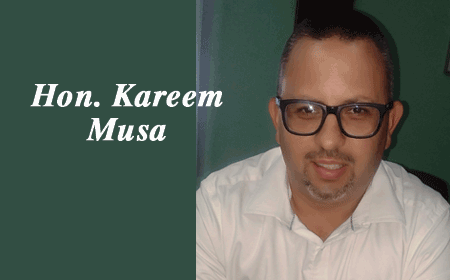“Once a Belizean, always a Belizean.” — Hon. Kareem Musa
BELIZE CITY, Tues. Nov. 6, 2018– Due to a technicality in the law governing the registration of electors, Belizeans living in the diaspora will not be able to vote in next year’s International Court of Justice (ICJ) referendum (April 10), in which Belizeans will weigh in on whether or not to seek a judicial settlement by the ICJ of the Guatemalan claim to Belizean territory. And the Government of Belize appears to be lacking the political will to remedy what many see as a grave injustice to Belizeans born in the country, especially in light of the fact that Guatemalans, who unconstitutionally obtained Belizean nationality, will be able to vote in the referendum.
People’s United Party (PUP) member of the House of Representatives, Hon. Kareem Musa, area representative for the Caribbean Shores constituency, has taken on the task of seeking a legislative remedy that would allow diaspora Belizeans to vote in the referendum next year.
After combing through the Standing Orders of the House of Representatives, Musa has now embarked on a mission to introduce a Private Member Bill to clear the legal obstacle in the Representation of People’s Act and allow diaspora Belizeans to vote in the ICJ referendum.
We asked Musa what led him to take on this fight for diaspora Belizeans. He told us that it is a struggle that has been an area of focus for him for a couple of years, “because once a Belizean, always a Belizean. No matter what part of the world we are living in, Belize is your home.”
Musa explained that with the advent of social media, we are now more connected with the diaspora than ever before. “So, we are now able to hear their aspirations on how they want to assist in developing our country, particularly in this referendum vote which is the biggest vote in our country since independence,” he said.
Musa said that since the government is not looking after the rights of Belizeans in the diaspora to participate in the referendum, he thought it “necessary as a member of the Opposition in crafting legislation to ensure that their voice is heard come April 10, 2019.”
We asked Musa to walk us through the process through which his Private Bill would have to pass.
“Standing Order 83 is a Private Members Bill, which is completely different from a bill presented by the government side. Private Members Bill means that it can be presented from the Opposition side. And this is something that is never utilized in the history of Belize,” Musa said.
He continued: “There is a three-months waiting period for them to review the bill, before this bill can actually get before the House of Representatives for a vote. The bill also has to be published, not only in the local papers, but also in the Government Gazette for the whole country to see what kind of bill I am presenting in the House of Representatives three months from now.”
Once the Clerk of the National Assembly gives him the permission to introduce the bill, the bill will be read a first and second time, and then it would be referred to a special select committee of the House by the Speaker.
Only members of the House of Representatives can object to a Private Member Bill and the objection has to be made to the Clerk of the National Assembly in writing, detailing the member’s objection.
Musa explained, however, that if the Prime Minister feels as strongly as he does about ensuring that all Belizeans get the right to vote in the referendum, there is a more expeditious way to have the bill passed. “The Prime Minister can take carriage of the bill and move with it as if though it was a government bill,” Musa said.
We asked Musa what would happen if the House of Representatives does not meet twice before the ICJ referendum date, or if his bill is not passed by the House.
Musa agrees that it is a possibility that the House could delay meeting, but said that there is usually a meeting before the Christmas break, and there is another meeting early in the New Year, and then there is the budget period when the House has to meet.
Musa said that it would be a very sad day for Belize if the bill is not passed.
Musa’s Bill is an Act to Amend the Representation of the People Act Chapter 9 of the Substantive Laws of Belize, Revised Edition 2011, and it would allow for Belizeans living in the diaspora to be able to register to vote in the ICJ referendum.
Musa estimates that there are hundreds of thousands of Belizeans who would benefit from his amendment, and have a voice on the existential issue of whether or not to take the Guatemalan claim to the ICJ for a judicial resolution.

